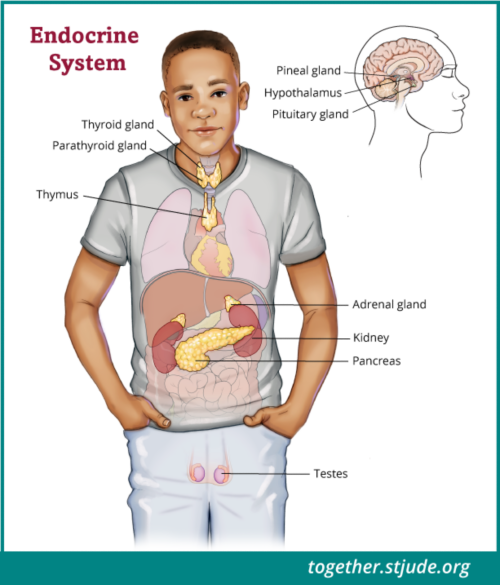Infertility is the inability to get a partner pregnant after a year or more of regular sexual intercourse without using any birth control methods.
Infertility can be a side effect of certain chemotherapy medicines, radiation treatments, surgical procedures, and drugs used to prepare patients for a stem cell transplant (bone marrow transplant.)
Before therapy starts, families should discuss the impact of treatment on the patient’s fertility. Families may also speak a fertility specialist who can discuss options to preserve fertility.
How the male reproductive system works
To understand fertility, it’s helpful to understand how the male reproductive system works.
The testes (testicles) are inside a loosely hanging pouch of skin known as the scrotum. In men, testes produce sperm and the male hormone testosterone. When sperm fertilizes an egg, a pregnancy occurs.
When boys enter puberty, the pituitary gland releases hormones that stimulate testosterone production. Testosterone controls many processes that cause puberty. These processes include the maturing of sperm and the development of male sex organs.
Testosterone also regulates functions such as:
- Deepening of the voice
- Enlarging of the penis and testicles
- Increasing the growth of facial and body hair
- Enhancing muscular development
How treatment affects fertility in males
Treatment that affects a patient’s reproductive organs and pituitary gland may have an impact on their fertility.
Take action before treatment starts
Before treatment begins, parents and the patient, if old enough, should talk with the care team about how cancer treatment could affect the patient’s ability to have children.
- If the treatment could affect fertility, ask the medical team what can be done to protect fertility.
- Find out the cost of treatments and if they are covered by insurance.
Procedures that can preserve fertility
Checking sperm after treatment
Sperm is checked 1 year after treatment ends. This finds out if the sperm are healthy. Patients give sperm samples that are sent to a lab for testing.
Healthy men make sperm their entire lives. If you have sperm after treatment, it is likely that you will keep making it. However, if your sample does not contain sperm after treatment, your body may not be able to make sperm.
Other ways to have children after treatment
There are many ways to become a father after cancer treatment. There is a chance that cancer treatment will not affect the ability to have children.
Other fertility options include:
- In vitro fertilization. This is when a health care provider uses your sperm to fertilize an egg in a laboratory. Then, the fertilized egg is placed inside the partner’s uterus where it grows.
- Sperm from a donor
- Adoption
Questions to ask before treatment begins
When your son is young, it may seem strange to discuss fertility options. But many health care providers believe that having the discussion before treatment begins is the best time.
Consider asking questions such as:
- Could treatment increase the risk of, or cause, infertility?
- Are there other recommended cancer treatments that might not cause fertility problems?
- Which fertility preservation options would you advise?
- What fertility preservation options are available at this hospital? At a fertility clinic?
- Would you recommend a fertility specialist (such as a reproductive endocrinologist)?
- Do you advise using condoms, based on the treatment I’m receiving?
- What are the chances that my fertility will return after treatment?
- How much do these fertility options cost? Are they covered by insurance? Are there financial resources available?


